One of my favorite places in the Anamallais, Manamboli is the fishing spot down the road from Uralikal Forest checkpost at the bottom of the dam on the Parambikulam River. Sandy (Sundeep Singh) was the Assistant on Uralikkal and Mr. Saleem Sheriff was the Group Manager.
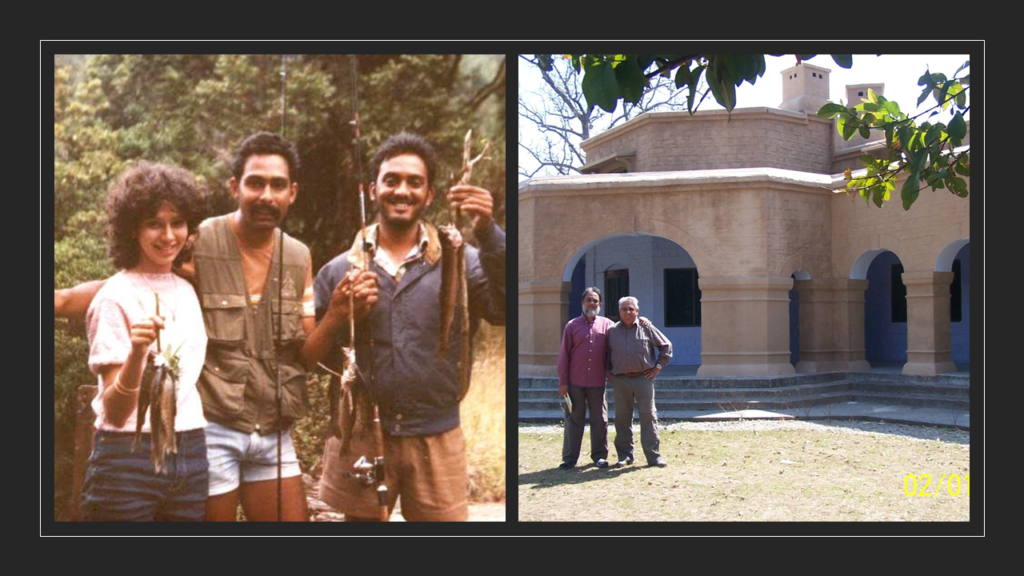
[Do read Sundeep Singh’s comment on this article. Mr. Salim Ali, who he mentioned is the world-famous ornithologist and naturalist who is called the ‘Bird man of India’. Hashim Tyabji who I have mentioned in this article, is his nephew. Beautiful days, beautiful memories, true friends.]
My dear friend Hashim Tyabji was visiting us and I decided to take him to see what we could see in this beautiful forest. Hashim, apart from being my dear friend, which is not his best achievement, is a very famous naturalist with an encyclopedic knowledge of birds. I never missed an opportunity to learn from him, the best way for which was to take him for a walk in the bush. It was very early in the morning and as Hashim and I walked along pathway that followed the Parambikulam River, the mist rose from the water and cast shadows at will as it played with early morning sun rays. It is a good idea when walking in such places to stay with your car for a while and allow the buzz in your ears, the sound of our noisy environments to fall silent. This is important for two reasons. One, only then will you be able to listen to the forest. Two, in a forest that is as full of beings which can be potentially dangerous to life, it is a good idea to have your hearing operating at peak performance. Nothing in the forest will attack you unprovoked. Animals don’t eat junk food. But you can blunder into one and irritate it enough for it to respond in kind to your own detriment. I have walked, sat in silence, even slept on the ground in river sand or a hammock in Amazonian rain forests as well as the forests of Central and South India and I am writing this now. I wouldn’t try this in Africa, though. Lions operate by different rules. Unlike tigers, they love junk food.
At one place where a forest giant had fallen, the sun was shining through and there was a leafy tree with some type of berry on it. On this tree were a multitude of birds, all apparently flying around randomly, eating the berries. Hashim stopped me silently with a hand signal and we squatted on our haunches to watch the birds. He showed me how different species of birds were eating from different levels on the tree. An amazing insight into the highly ordered life of birds. ‘Free as a bird’ is a figment of human imagination. Birds are so tied-in to their life routines that some bird species have been known to die out in an area because a tree on which they were dependent for food or nesting had been cut down. The importance of habitat conservation in the protection of avian and animal species can hardly be overemphasized. This is why when logging companies talk about reforestation, by planting millions of trees of one species in the place of the multi-species forest they demolished, it is such a farce. Especially the animals, birds, insects, amphibians, and reptiles that used to live in the natural forest and which died with the trees, will never return. That is why when you walk in one of these so-called forests, plantations really, there is dead silence. The silence of the grave. While when you walk in a natural forest, as Hashim and I were doing that morning, the forest speaks to you. You can hear the breeze in the treetops. You can hear the murmuring of the river as it flows over the rocks at the base of the sluice gates, where we used to fish. You hear the rustle of leaves as a Rat Snake chases its prey. You can hear the booming call of the Nilgiri Langur sentinel as he sounds the alarm.
The Western Ghats have evergreen rain-forest. The first calls in the Anamallais, as the sun went down were always the jungle fowl going up to roost. First the cocks would crow – kak kaak, kaa kak?? – with a question mark at the end. Then the hens would sometimes cackle as they flew up to their roosts. Once they settled in, the Nightjars would start flitting on silent wings, catching moths and other insects in flight as they came out of their hiding places. It was a fascinating sight to watch the Nightjars as they took their interceptor flights. The Nightjar would sit in an open place (on a small rock or in the middle of a path) and made its characteristic call chut-chut-chut-churrrrrrrrrrrr. They repeated this call endlessly, sitting absolutely still but watching the world very closely. As soon as it saw a poor unsuspecting insect going about its business, the Nightjar would erupt into the air and the world insect population is reduced by one. 100% kill rate. Amazing birds.
Then there would be silence for a while as the jungle settled for the night. As the first light of the moon strengthened, the owls would come out of their roosting places, where they had been hiding both from the sun as well as from crows who harass them mercilessly if they saw them in the open. They hunt in pairs. They flew out onto the branch that was their take off perch, one followed by the other. They would sit there for a while and talk to each other, perhaps discussing strategy. Then he would glide away in one direction and she in another. You must see an owl in flight to understand the meaning of grace. Complete silence so that its prey has no idea of death as it comes to it in the dark.
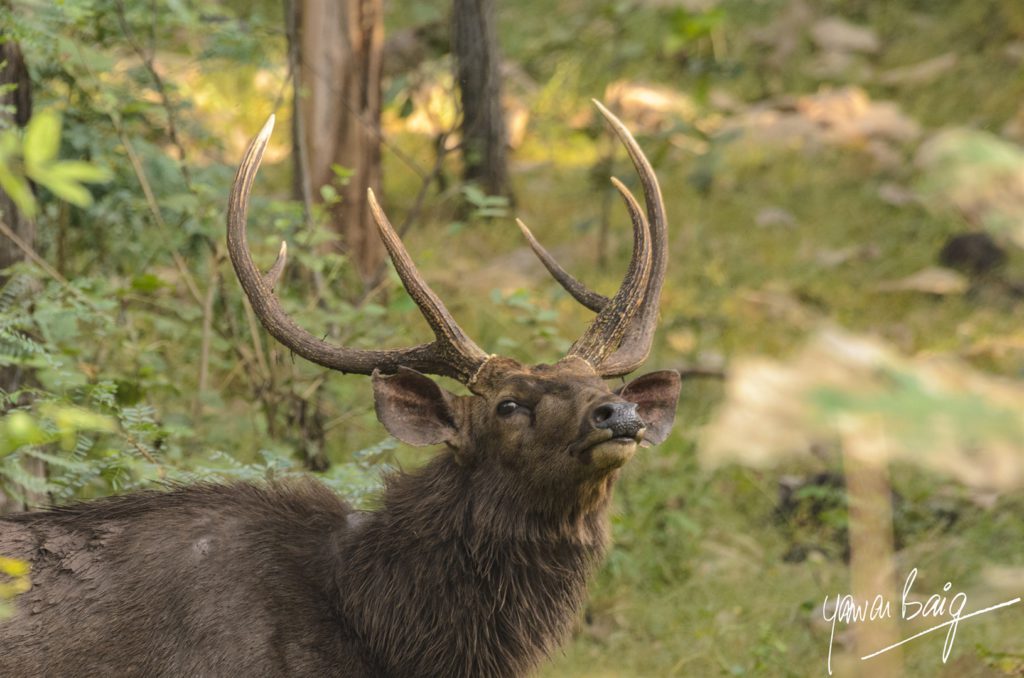
Suddenly, you would hear the dhank-dhank of the Sambar. This was the alarm call telling the other tenants of the jungle that one of the two big cats that live in this forest, the tiger, or the leopard, is on the prowl. The Sambar is the most reliable of the sentinels which call out when they see these predators. In the Anamallais we do not have Cheetal (Axis Axis or Spotted deer) who also are reasonably reliable as alarms for tiger sighting. We have the Muntjac (Barking deer) who is so skittish that it sounds the alarm for almost anything. But Sambar call only if they see one of the big cats and so when you hear a Sambar calling, you can be sure that the tiger walks. If you follow the call, you can tell the direction of the tiger’s travel. If it lies down, the Sambar will stop calling. Just listening to sounds in the forest is a delight. During the day, the Nilgiri Langur with the black faces, beautiful shiny grey fur and impossibly long tails who have one of their number as a permanent lookout are the sentinels. Everyone relies on them because their high vantage point gives them a distinct advantage.
But at night, the Langur are among the first to go to the treetops where they spend the night, safely out of harm’s way. Langurs are at the top of the leopard’s dietary preference and so no wonder they prefer to be where the leopard is not subjected to any temptation. Despite that they fall prey because at night Langur are blind in the dark while for the leopard, it is like hunting in daylight. Leopards are totally at home in treetops, even taking prodigious leaps, seeming to fly from one branch to another and one tree to another. It is a dangerous world for all prey, everywhere. Listening and recognizing sounds is a critical survival skill that one must learn if one wants to survive in the forest.
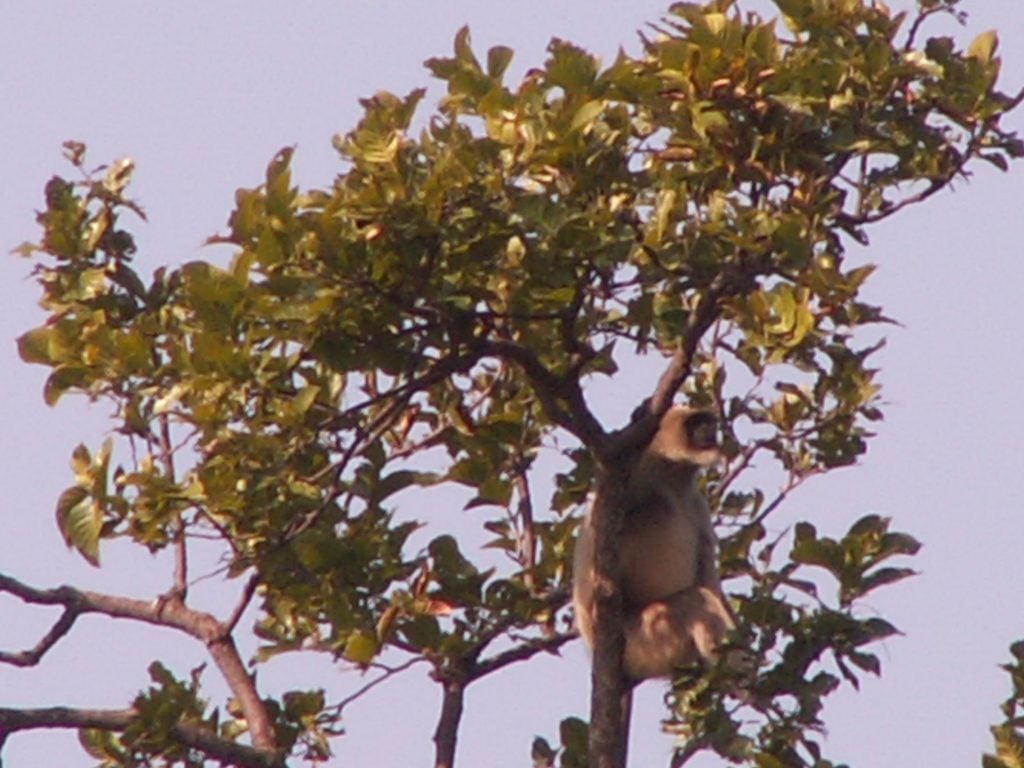
The Sambar stopped calling. That means that the tiger has killed and is feeding or lying down. There is silence for a while. You watch the moon traveling its route, uninterested in the goings on of the world. Then, as you look at the deep shadows, you might see one of them move and come out into the open, illuminated by the moon. You see the shine of his black coat and his white socks. You hear the snort as the bull clears his nose. The Gaur have arrived. He sounds the all-clear, the cows and calves emerge and all of them move to the shallow pool to drink. There was not enough water for all of them to drink together so they remain there for as long as it takes for the pool to keep filling as they keep emptying it.
The presence of one herbivore is a sign to others that the situation is safe. It was essential of course for us to keep our silence, breathing softly and staying completely still. The animals have highly developed senses because their life depends on them. At the slightest movement or sound, they would explode into a gallop and vanish. For herbivores, speed is their only defense against predators and so they never relax.
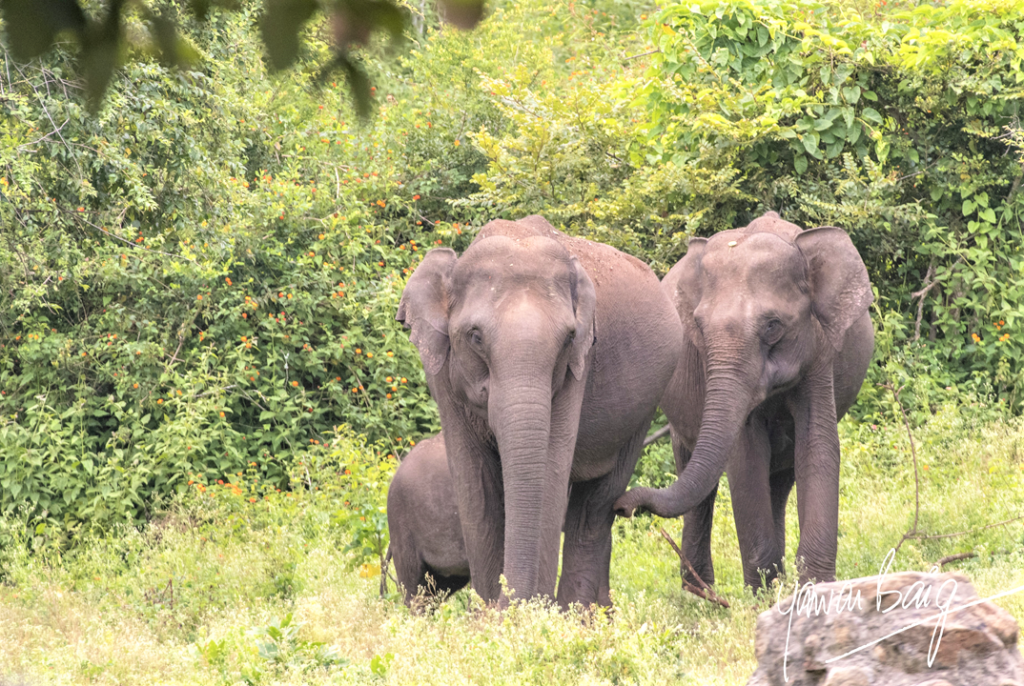
Suddenly we smelled them long before we saw them. Hashim and I stepped down from the road and walked a few feet into the forest and stood behind some big trees. And lo and behold, a whole herd of elephants came along the road. Gliding soundlessly on huge feet that they put more delicately on the ground than would a ballet dancer. All going to the river for their morning drink and bath. How can I describe the sense of excitement? The elephants knew we were there of course. But they knew that we meant no harm and so they went their way. The so-called Law of the Jungle is that if you give respect, you get respect. It is our so-called civilized society that lives by a different rule. The payment for this chance to see elephant life was the leeches that we had to pull off ourselves once we came back onto the road after the herd had passed. But that was hardly something to complain about for the privilege of being a part of life that has gone on for millennia before us and now seems in grave danger of ending forever.
We got a call one day from Ms. Brewty, the Secretary to our General Manager, Mr. N. K. Rawlley. She said, “Mr. Baig, Mr. Rawlley asked me to inform you that there are two ladies from London who are company guests and are staying in Iyerpadi at the guest house. They would like to see some forest area. Could you please help with this?” Forest and me? Of course, I was delighted to help. Next day the ladies arrived in the company jeep and my wife, and I met them at the Uralikkal checkpost. Of the two ladies, one was rather large and the other looked like she was the counterpoint, remarkably thin.
We left our car, and we all went down the windy road to the Manamboli Dam, in the jeep. That drive is very productive in terms of wildlife sightings and sure enough we saw Malabar squirrels, Lion-tailed Macaques, and a Barking deer which crossed the road exactly at the place I expected it to……I am convinced that it did this for a living. We stopped for a short break at the bottom of the concrete-surfaced road which ended at the Power Generation House. There was some flow over the sluice gates of the dam, and it was very relaxing to listen to the sound of flowing water. Then we started down the unpaved forest road to Topslip. This road runs along the Manamboli river. As we rounded a bend, I recalled an incident when my dearest friend Bertie and I were fishing at the foot of the rapids on the other side of the dam. We would stand in rapidly flowing water below the sluice gates and cast for Mahseer while drinking in the atmosphere of the jungle. Not a sound except from the river or from a bird celebrating its life. It is unbelievable how beautiful silence is. Refreshing and rejuvenating more than food or water.
That day we were fishing in our usual spot, when one of the fish we had caught disappeared. “Dai Baig Dorai, you cannot even tie a bloody fish properly man!!” yelled my dear friend. We had each caught a good sized mahseer and tied them with a line through the gills and tied to a tree root. That way the fish remains alive and fresh. His was still there. Mine had disappeared. What gave the game away was that the line looked like it had been bitten through. Just then I heard the whistles….two otters talking to one another, no doubt with evil intentions on Bertie’s fish. I called out to him in a low voice, “Dorai, noke awaday” (Sir, look over there) and I pointed to the otters. Bertie laughed so much that he almost fell into the water. “What the bloody hell, so this is the bugger who stole our fish!!! Man, what do you expect? We go into their home and steal their fish, so they decide to freeload on our effort.” What memories!! But my friend is gone. So would have the otters. Nothing lives that long in the forest. Only I am alive to tell the tale and to remember my friend and to live once again that magical day, this time on behalf of both of us.
On this road, one thing to watch out for was elephants. It was a narrow road with very thick, almost impenetrable forest on one side, the river on the other. Not the best place to come face to face with elephants. Mercifully, elephants are wiser than we are and when they hear a vehicle coming their way, they move off into the jungle and you do not see them. We did not meet any until we got to the Forest Department’s elephant camp. This was where they kept their elephants used for logging and other forest related activity. We took a break for coffee and our standard omelet/paratha snack and looked around the camp. The head Mahawat (elephant caretaker and driver) met us and explained what they did in the camp. I asked him if he would be kind enough to give a short ride on one of the elephants to our guests. There was a huge, very black bull elephant which was tethered at one end of the line. I asked the Mahawat if we could ride him.
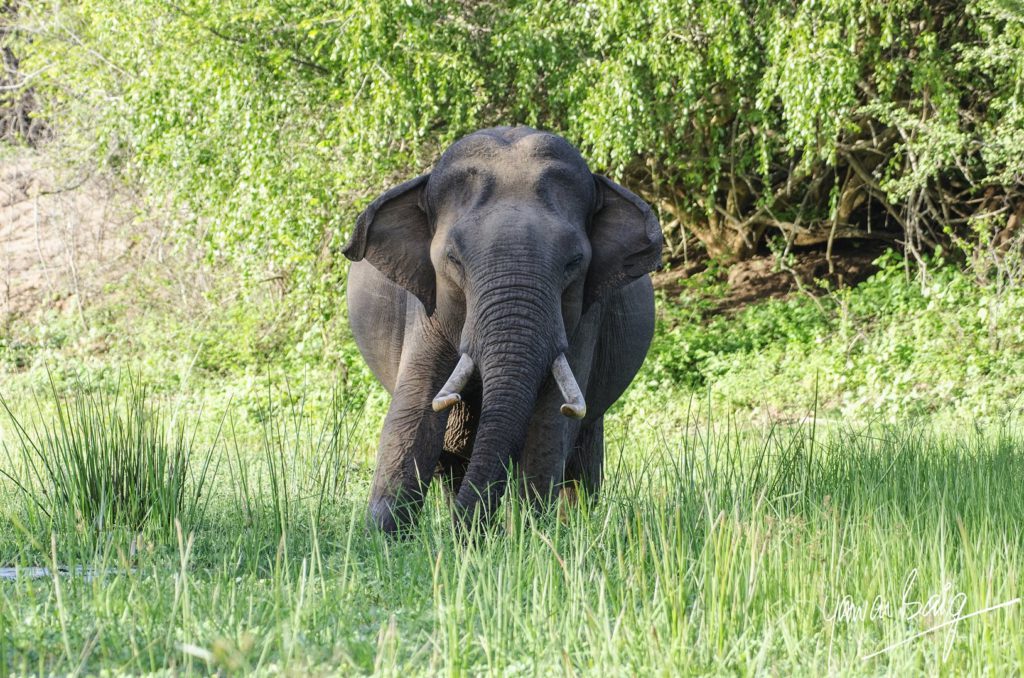
The Mahawat did not look very happy about this but agreed and went off to get a couple of gunny sacks. He got the elephant to kneel and climbed up on his knee, and holding his ear, he pulled himself up on his neck. He placed the empty sacks on his neck and tied them down. That was his seat. Then he asked me to climb on. I did and settled astride behind him. Not easy at all as elephants have a very prominent backbone with protruding vertebrae. When you sit astride, you are in imminent danger of doing permanent damage to your ability to continue your line of descendants. That is why when you ride elephants in our wildlife reserves, they saddle them with very thick mattresses or have a howdah in which you sit much like sitting on a sofa. But we were in a working camp devoid of these luxuries. The Mahawat was sitting on the neck, where the vertebrae do not protrude, and he had his gunny sack cushion under him. But the “passenger” was on his own. The Mahawat called out his order and the elephant stood up. If you have ever seen an elephant standing up from a kneeling position, you will know what happens. It is as close to being on the bow of a ship in a storm as you are likely to be on dry land. I knew what was coming and braced myself and remained atop the huge animal without mishap. The Mahawat took us for a short walk-around in the forest and we returned to the camp.
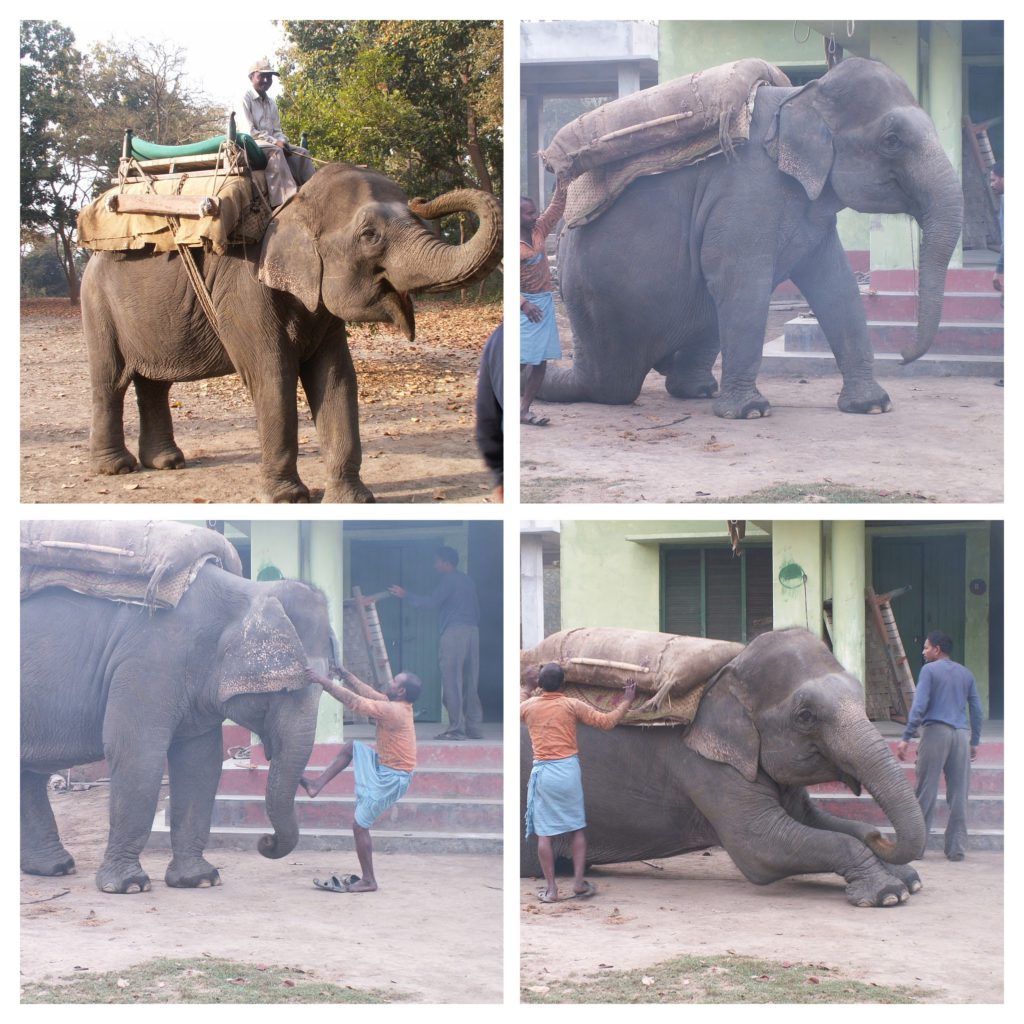
Next was the turn of our guests. The thin one declined the opportunity but the larger one was keen to go. She tried to climb up on the elephant’s knee as if it were a staircase and slipped. The Mahawat spontaneously reached to take her hand to save her from an ignominious landing in the dirt almost unseating himself in the process. Eventually, the lady managed to get astride the neck of the elephant. The expression on her face when she sat there spoke volumes of what she must have encountered. But some things cannot be spoken aloud and so she suffered in silence. Then the Mahawat shouted his order to the elephant and the animal lurched forward to get up. The lady fell forward on top of the Mahawat and as the elephant lurched backwards straightening his forelegs, she was thrown back and grabbed the Mahawat in a bear hug. The man disappeared into the depths of British womanhood but not without a plaintive cry for help, “Ayyaaaaaa!!” The elephant took them for another short ride in the forest and then returned and we had a repeat performance of lurching, grabbing and a plaintive cry. A memory that refuses to go away. The elephant, however, was not amused. It started rumbling and the Mahawat told us that he did not want to chance another ride. I agreed with him, more so because I didn’t want to explain to Mr. Rawlley how his guests or we, left this vale of tears. Elephants are very patient and tolerant but are never really domesticated. They have an uneasy relationship of cooperation with humans, which can break if you push their patience beyond their tolerance. Doesn’t happen often but when it does, it is spectacular. Good old days and good old memories.
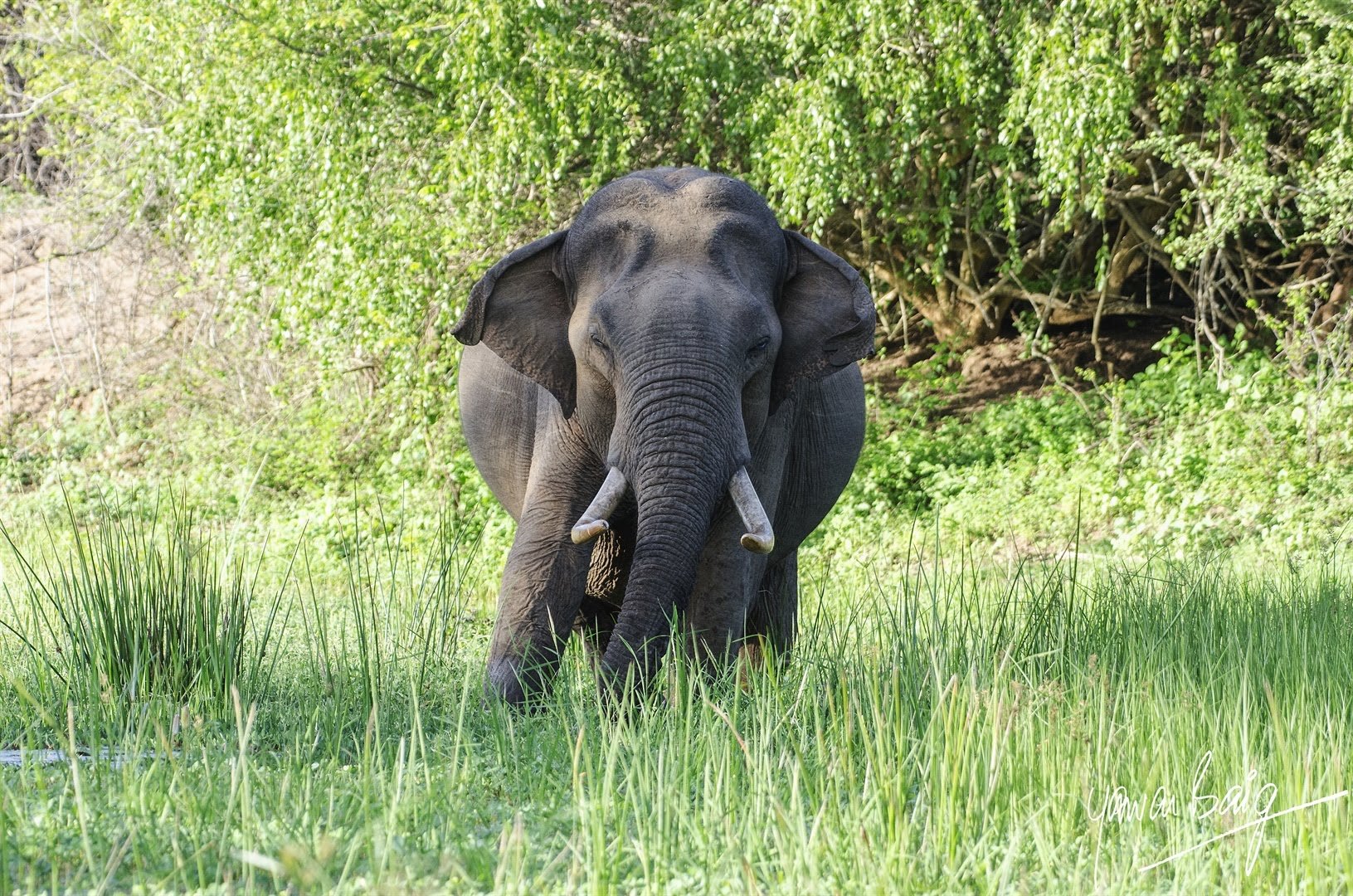
Good to relive these memories with the lovely pachyderms ! These lovely beings are ones that I adore and respect quite a bit given their intelligence and their place in the ecosystem. I have a few tales of my own to relate to my encounters with elephants. Well written as always Yawar !
Amazing I can just picture sleeping in the jungle and listening to natures beauty. And as for riding an Elephant like that, amazing! Thank you for sharing your stories!
This was a very interesting article.
Great post! Elephants are amazing animals!
Amazing storytelling, it’s like I was actually within your world here. You opened my eyes when speaking about conservation of nature, you cannot right wrongs with nature. Each habitat is home to a unique set of creatures, to destroy its home is to destroy its presence.
Beutiful article. The beauty of the nature is diving deep spiritualy and appreciation of the animals and the nature itself
Great stories….quite unbelievable for those who have not experienced it…need to do it again.
I was transported, wishing I could experience all the sights and sounds of the natural forest! So poignant the silence of the planted trees opposed to the crescendo of the living habitat.
Very nice pictures elephants are amazing animals
Thanks for the introduction Yawar. Those were the days. I was the Assistant Manager of Uralikal for 2 1/2 years and Manager again for 3 Years. Mr Saleem Sheriff was our Group Manager then. I remember our forays into the Jungle where no one was permitted as it was a Core area of the Perumbikullam reserve. As all the forest guards’ family stayed in my allocated quarters we were welcome to this gem of a locale. The mahout was Sri Thangavelu an experienced forester and then quite old, donning the mantle of Assistant Range Officer. He always carried a loaded… Read more »
I always love reading about your memories! I have always been fascinated with how the animals interact just with each other, with their environment, and with us humans. Peaceful until they see any sign of threat.
Very well written- captured the essence of the wild life in the anamallais.Brought back memories of the lovely times spent in the anamallais !
Superbly written by someone who loves and understands, wildlife and nature. Your writing brings the jungle to life. Really enjoyed reading it. On a lighter note, the incident of the British lady on the elephant reminds me of a Bengali family who were visiting the Camel Research Center here at Bikaner. I had taken a bunch of school kids there at the same time. The center has a camel which tourists can ride, and the Bengali couple decided to get some good photographs of themselves riding. Their son was making a video on his mobile phone. The camel too stands… Read more »
An interesting read. It is envious to learn that the wild is still there for us to experience but, it is diminished by the greed of man. I felt sad to read that. What inspires me in the article is the human relations that expand beyond time and space illustrating the reality that our legacies as humans are our personalities and characteristics we glean from all whom we encounter or come into contact with. This for me is the takeaway. The Mahawat’s attitude and love for his job bespeaks a world we lost contact with – a world of serving… Read more »
Superb storytelling. It was as if I was on the journey riding the Elephants. Amazing creatures and great post. Thank you for sharing!
Truly fascinating to get into the world of natural jungles. I never knew crows can be a source of irritation for owls, very surprised. It’s on my bucket list to visit a jungle and experience its magnificence.
Loved the article. Being familiar with the area brought back some of my own memories. Must get down to reading more of In a Teacup. Thank you Yawar.
Amazing story. Subhan~Allah! Felt like being there the whole time.
So beautifully penned down,Yawar Bhai. Really felt as if we are going through the wonderful nature enjoying every bit of it. It was like a real running commentary taking us through the forest, the river, the wildlife and so on… Thank you so much for the nostalgic memories to the late 1980s. I never knew that trouts were available in the South. I have only tasted it in Uttarakhand and Kashmir. Literally, saliva in my mouth, it’s a delicacy indeed,so soft and supple 😋
intresting Article, its like walking The Forest again with Yawar saab
A fascinating recap of the encounter with the gentle Gaints. As usual very beautifully written . Really sad that a vast area of forest cover is disappearing every day. Thanks very much for reminding that each one of us has a role and responsibility in preserving this precious bounty of nature.
Wow such an amazing story. So glad I came across this article